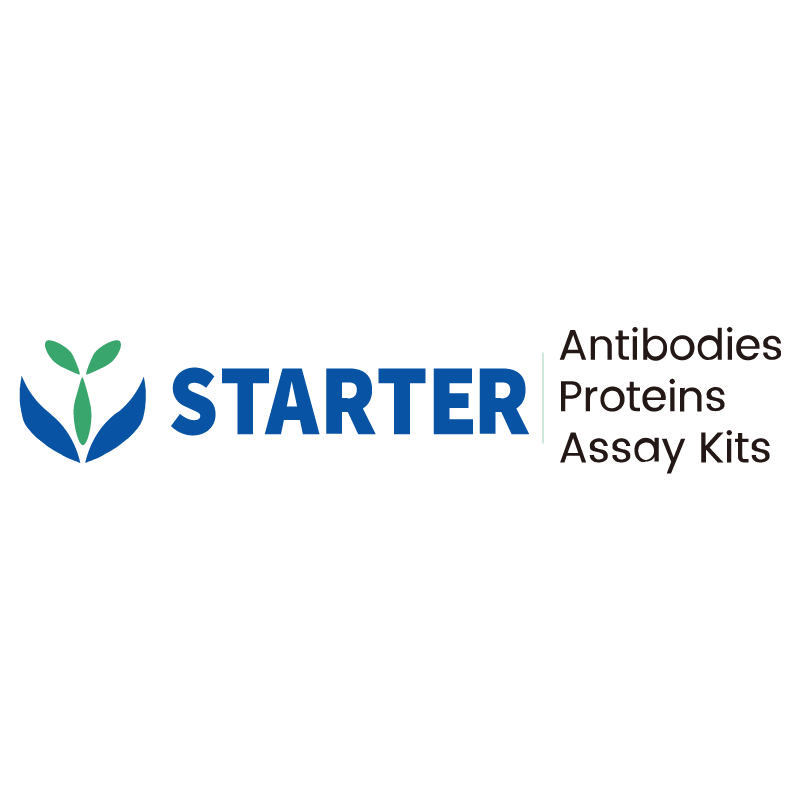WB result of EpCAM Recombinant Rabbit mAb
Primary antibody: EpCAM Recombinant Rabbit mAb at 1/500 dilution
Lane 1: HeLa whole cell lysate 20 µg
Lane 2: HT-29 whole cell lysate 20 µg
Lane 3: A431 whole cell lysate 20 µg
Lane 4: HCT 116 whole cell lysate 20 µg
Lane 5: T-47D whole cell lysate 20 µg
Negative control: HeLa whole cell lysate
Secondary antibody: Goat Anti-rabbit IgG, (H+L), HRP conjugated at 1/10000 dilution
Predicted MW: 35 kDa
Observed MW: 30-38 kDa
Product Details
Product Details
Product Specification
| Host | Rabbit |
| Antigen | EpCAM |
| Synonyms | Epithelial cell adhesion molecule; Ep-CAM; Adenocarcinoma-associated antigen; Cell surface glycoprotein Trop-1; Epithelial cell surface antigen; Epithelial glycoprotein (EGP); Epithelial glycoprotein 314 (EGP314; hEGP314); CD326; GA733-2; M1S2; M4S1; MIC18; TACSTD1; TROP1 |
| Immunogen | Synthetic Peptide |
| Location | Cell membrane |
| Accession | P16422 |
| Clone Number | SDT-078-128 |
| Antibody Type | Recombinant mAb |
| Isotype | IgG |
| Application | WB, IHC-P, ICC |
| Reactivity | Hu, Ms, Rt |
| Positive Sample | HT-29, A431, HCT 116, T-47D, mouse colon, rat colon |
| Predicted Reactivity | Pg, Bv |
| Purification | Protein A |
| Concentration | 0.25 mg/ml |
| Conjugation | Unconjugated |
| Physical Appearance | Liquid |
| Storage Buffer | PBS, 40% Glycerol, 0.05% BSA, 0.03% Proclin 300 |
| Stability & Storage | 12 months from date of receipt / reconstitution, -20 °C as supplied |
Dilution
| application | dilution | species |
| WB | 1:500-1:2000 | Hu, Ms, Rt |
| IHC-P | 1:2000 | Hu, Ms, Rt |
| ICC | 1:250 | Hu |
Background
EpCAM (epithelial cell adhesion molecule, CD326) is a 35–40 kDa type-I transmembrane glycoprotein expressed on most epithelia, where it first assembles into cis-dimers that further cluster into tetramers to support homotypic cell–cell contacts, and then—through sequential proteolytic cleavage—releases its intracellular domain (EpICD) that partners with β-catenin, FHL2 and LEF1 to enter the nucleus and drive Wnt-dependent transcription of genes controlling proliferation, stemness and epithelial-to-mesenchymal transition, thereby functioning not merely as an adhesion molecule but as a dynamic signaling hub that is highly up-regulated in most carcinomas, marks circulating tumor and cancer stem cells, and serves as both a prognostic biomarker and a therapeutic target while mutations that truncate or mis-localize the protein underlie the severe congenital diarrhea disorder tufting enteropathy.
Picture
Picture
Western Blot
WB result of EpCAM Recombinant Rabbit mAb
Primary antibody: EpCAM Recombinant Rabbit mAb at 1/500 dilution
Lane 1: C2C12 whole cell lysate 20 µg
Lane 2: mouse colon lysate 20 µg
Negative control: C2C12 whole cell lysate
Secondary antibody: Goat Anti-rabbit IgG, (H+L), HRP conjugated at 1/10000 dilution
Predicted MW: 35 kDa
Observed MW: 30-38 kDa
WB result of EpCAM Recombinant Rabbit mAb
Primary antibody: EpCAM Recombinant Rabbit mAb at 1/500 dilution
Lane 1: rat colon lysate 20 µg
Secondary antibody: Goat Anti-rabbit IgG, (H+L), HRP conjugated at 1/10000 dilution
Predicted MW: 35 kDa
Observed MW: 30-38 kDa
Immunohistochemistry
IHC shows positive staining in paraffin-embedded human colon. Anti-EpCAM antibody was used at 1/2000 dilution, followed by a HRP Polymer for Mouse & Rabbit IgG (ready to use). Counterstained with hematoxylin. Heat mediated antigen retrieval with Tris/EDTA buffer pH9.0 was performed before commencing with IHC staining protocol.
IHC shows positive staining in paraffin-embedded human colon cancer. Anti-EpCAM antibody was used at 1/2000 dilution, followed by a HRP Polymer for Mouse & Rabbit IgG (ready to use). Counterstained with hematoxylin. Heat mediated antigen retrieval with Tris/EDTA buffer pH9.0 was performed before commencing with IHC staining protocol.
IHC shows positive staining in paraffin-embedded human endometrial cancer. Anti-EpCAM antibody was used at 1/2000 dilution, followed by a HRP Polymer for Mouse & Rabbit IgG (ready to use). Counterstained with hematoxylin. Heat mediated antigen retrieval with Tris/EDTA buffer pH9.0 was performed before commencing with IHC staining protocol.
IHC shows positive staining in paraffin-embedded human thyroid cancer. Anti-EpCAM antibody was used at 1/2000 dilution, followed by a HRP Polymer for Mouse & Rabbit IgG (ready to use). Counterstained with hematoxylin. Heat mediated antigen retrieval with Tris/EDTA buffer pH9.0 was performed before commencing with IHC staining protocol.
IHC shows positive staining in paraffin-embedded mouse colon. Anti-EpCAM antibody was used at 1/2000 dilution, followed by a HRP Polymer for Mouse & Rabbit IgG (ready to use). Counterstained with hematoxylin. Heat mediated antigen retrieval with Tris/EDTA buffer pH9.0 was performed before commencing with IHC staining protocol.
IHC shows positive staining in paraffin-embedded rat kidney. Anti-EpCAM antibody was used at 1/2000 dilution, followed by a HRP Polymer for Mouse & Rabbit IgG (ready to use). Counterstained with hematoxylin. Heat mediated antigen retrieval with Tris/EDTA buffer pH9.0 was performed before commencing with IHC staining protocol.
IHC shows positive staining in paraffin-embedded rat stomach. Anti-EpCAM antibody was used at 1/2000 dilution, followed by a HRP Polymer for Mouse & Rabbit IgG (ready to use). Counterstained with hematoxylin. Heat mediated antigen retrieval with Tris/EDTA buffer pH9.0 was performed before commencing with IHC staining protocol.
Immunocytochemistry
ICC shows positive staining in HT-29 cells (top panel) and negative staining in human PBMC cells (below panel). Anti-EpCAM antibody was used at 1/250 dilution (Green) and incubated overnight at 4°C. Goat polyclonal Antibody to Rabbit IgG - H&L (Alexa Fluor® 488) was used as secondary antibody at 1/1000 dilution. The cells were fixed with 100% ice-cold methanol and permeabilized with 0.1% PBS-Triton X-100. Nuclei were counterstained with DAPI (Blue). Counterstain with tubulin (Red).


